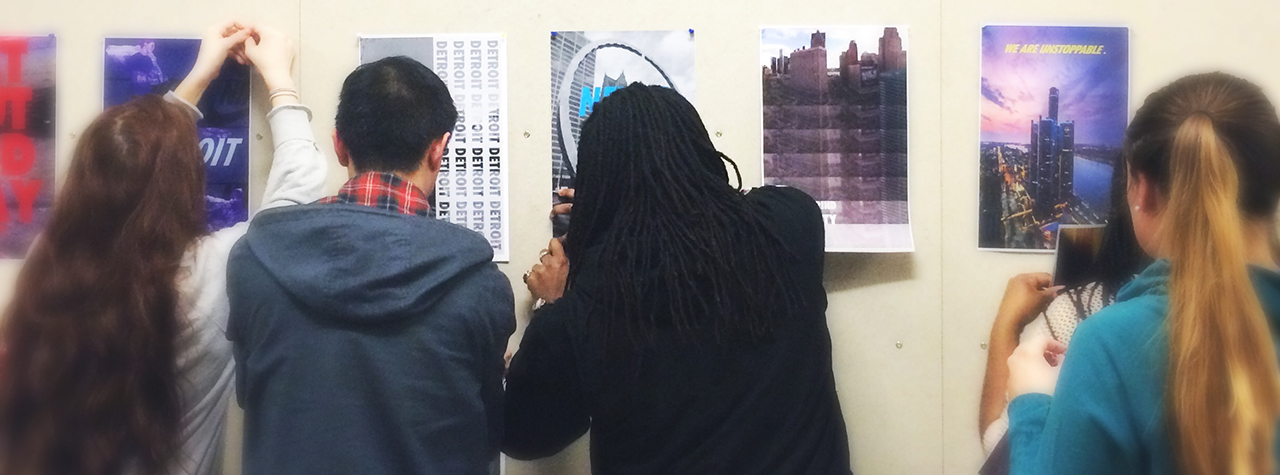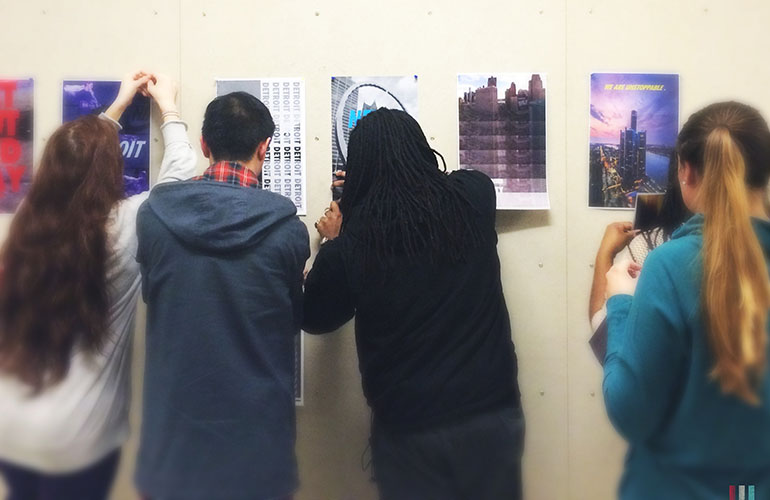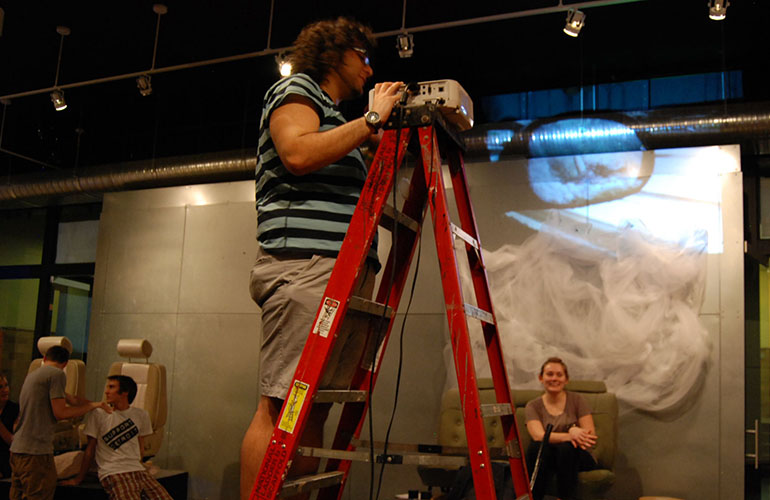Digital Media Studies

IMPORTANT NOTE: Detroit Mercy is currently conducting a full curriculum and strategic planning review of the Digital Media Studies program. We are exploring new synergies with other technology, communications and design programs on campus, and we plan to re-launch the program with a new curriculum format in the near future to provide enhanced and comprehensive learning opportunities for our students. In the interim, Detroit Mercy will not accept new students in the DMS program at this time.
Theory, design and technology are woven together in Detroit Mercy’s Digital Media Studies program. Graduates of this unique program are prepared for work in fields such as graphic, web or videogame design, branding, print and video among other digital media professions.
During this four-year-bachelor of arts program, students learn in small classes that feature in-depth dialogue and studio-based critiques taught by professors who are working professionals. Hands-on projects include posters and experimental gallery installations. Community outreach, service learning and social justice projects are central to Detroit Mercy’s Digital Media Studies program.
Expected Learning Outcomes
-
Program Purpose
 The Digital Media Studies (DMS) major program is designed to produce emerging professionals with a strong inter-disciplinary foundation that can be used effectively in a variety of careers in design-related industries or graduate study. Graduates are armed with processes and skills that can be used in multiple venues and transferred to existing and emerging design and media environments. DMS focuses on three foundational curriculum components: design, theory and technology. Students develop design skill sets; master knowledge of graphic design including history and theory; and implement processes that integrate current "best practices" in research, inquiry, technical and communication skills. Projects frequently aim to reinforce the Detroit Mercy mission through engagement with the urban context and community as well as through investigations of issues of social justice. A strong inter-disciplinary core curriculum develops critical thinking skills to create the foundation for creative applications, advanced skill sets, and experimentation. To underscore the impact of a broad inter-disciplinary foundation, a minor is required in addition to the BA in DMS. A minor complements the digital media skills necessary for working in a broad array of professions. DMS graduates will be able to participate fully as thoughtful, communicative, creative, compassionate, engaged, and successful members of the global society as reflected in the Jesuit and Mercy identities..
The Digital Media Studies (DMS) major program is designed to produce emerging professionals with a strong inter-disciplinary foundation that can be used effectively in a variety of careers in design-related industries or graduate study. Graduates are armed with processes and skills that can be used in multiple venues and transferred to existing and emerging design and media environments. DMS focuses on three foundational curriculum components: design, theory and technology. Students develop design skill sets; master knowledge of graphic design including history and theory; and implement processes that integrate current "best practices" in research, inquiry, technical and communication skills. Projects frequently aim to reinforce the Detroit Mercy mission through engagement with the urban context and community as well as through investigations of issues of social justice. A strong inter-disciplinary core curriculum develops critical thinking skills to create the foundation for creative applications, advanced skill sets, and experimentation. To underscore the impact of a broad inter-disciplinary foundation, a minor is required in addition to the BA in DMS. A minor complements the digital media skills necessary for working in a broad array of professions. DMS graduates will be able to participate fully as thoughtful, communicative, creative, compassionate, engaged, and successful members of the global society as reflected in the Jesuit and Mercy identities.. -
Curricular Structure
Design, Theory and Technology Foundation
 The strategy of the program's curriculum is to offer a solid design foundation rooted in an urban community- and student-centered tri-platform approach, which is reinforced in all courses (in accordance with course level and expectations): design, theory and technology. The program core (30 credits) provides a foundation in design: developing and analyzing historic and philosophical formulations of design and design theory, experience with digital media technology and writing skills, familiarity with design strategies, processes and techniques with an overview of contemporary design issues. As with many design programs, an element of verbal presentations (of work, concepts and research) is inherent in most if not all DMS courses.
The strategy of the program's curriculum is to offer a solid design foundation rooted in an urban community- and student-centered tri-platform approach, which is reinforced in all courses (in accordance with course level and expectations): design, theory and technology. The program core (30 credits) provides a foundation in design: developing and analyzing historic and philosophical formulations of design and design theory, experience with digital media technology and writing skills, familiarity with design strategies, processes and techniques with an overview of contemporary design issues. As with many design programs, an element of verbal presentations (of work, concepts and research) is inherent in most if not all DMS courses.Through the required minor, students develop a complementary formal knowledge base in a chosen discipline outside of DMS. The minor allows students to develop additional inter-disciplinary skills in areas such as, but not limited to: creative writing, philosophy, psychology, business, sports communication journalism, etc. Coupled with the BA in DMS, the minor solidifies a broad connection both within the University as well as within the professional and world knowledge context.
Active Learning
One very important aspect of the DMS program is learning how to think and solve problems using intentional design through an engaging curriculum and projects. In addition to learning specific design and software skills, students are engaged with contemporary design and media through reading, researching, analyzing, discussing, creating (making and doing) and presenting their research and projects. The curriculum engages the students with ideas and theories through multiple lenses. Frequent, all-class critiques reinforce communication and presentation skills and challenge students to reassess their assumptions and approaches. Projects and class time are rooted in hands-on digital projects in a process-oriented framework. Students are provided with the basics of software and design approaches and are assigned projects crafted to challenge the student to give their creative visions ‘form’ through the digital artifact. Students are exposed to design projects geared toward the professional setting to prepare students for the rigors of professional life. Students learn concepts, ideas and theories in the classroom and then develop and refine their knowledge, skills, creative vision and approaches through individual projects, the critique setting, and (optional) internship opportunities. Graduates leave DMS with meaningful hands-on experience, grounded on solid historical, critical thinking and technical competencies. This allows our students to compete with graduates of other university programs for jobs and post graduate degrees in the educational, professional and/or academic worlds.
-
Learning Outcomes
1. Design: Development of a Personal Creative Voice
Students will integrate knowledge of design history, concepts and processes into a personal approach to creating digital artifacts. Courses that contribute: DMS 1710, DMS 1800, DMS 1910, DMS 2910, DMS 3910, DMS 4910, DMS 4911, DMS 4980, DMS 4981
2. History & Design Concepts
Students will demonstrate a comprehension of historical design concepts and movements and design theory. Course that contributes: DMS 1710 and DMS 1800.
3. Theory
Students will demonstrate a comprehension of design theory and theorists. Course that contributes: DMS 1710 and DMS 1800.
4. Technology Skill Development
Students will demonstrate analytical, conceptual and technical skills in a variety of media. Courses that contribute: DMS 1710, DMS 1800, DMS 1910, DMS 2910, DMS 3910, DMS 4910, DMS 4911, DMS 4980, DMS 4981
-
Evidence of Learning
 Most formal assessment occurs within classes or faculty review as students progress through advanced courses. In addition, the student portfolio system (a directed study course typically completed in their senior year) facilitates review of student progress. Informal assessment is provided by post-graduate tracking.
Most formal assessment occurs within classes or faculty review as students progress through advanced courses. In addition, the student portfolio system (a directed study course typically completed in their senior year) facilitates review of student progress. Informal assessment is provided by post-graduate tracking.Direct Measures
Competencies with basic knowledge, analytical skills applied to fundamental body of knowledge, and basic production skills are assessed by:
- Quizzes and examinations
- Projects
- Research and analytical presentations and projects
- Tracking progress by the professors, program director and advisor
- Evaluation of artifacts collected in individual student portfolios
Indirect Measures
Indirect measures include but are not limited to the following:
- Course evaluations
- Exit surveys, alumni questionnaires and placement data
- Feedback from academic and industry professionals (internships)
- Feedback from graduates and colleagues
Learning and Teaching Assessment and Improvement
Individual (adjunct) faculty members obtain feedback from their students via course evaluations at the end of each semester. This feedback is evaluated in terms of strengths and weaknesses in both faculty delivery and course content. Annually each faculty member is encouraged to report the results of this self-assessment and reflection along with the efforts he/she has made to improve personal teaching and curriculum content with the program director. Recommendations and action items may be recorded by the director at this time and reviewed with the faculty member as part of the next Annual Review.
Collectively, the DMS Advisory Committee examines the flow of course content and student skills through the entire program curriculum. Specifically in focus are the continuities and growth of skills in design and technology along with references to history and theory. Consideration of this information may result in proposed curricular changes. The evaluation of potential changes is made by the DMS Director and approved by the DMS Advisory Curriculum Committee as well as the School of Architecture faculty council and Dean.
Degree Options
-
Digital Media Studies (DMS) Major Requirements: 67 Credits
(61 credits with the Core’s DMS 1710 and PHL 1000 +including an 18-credit Minor in another area of study):
DMS Core Required courses 43 credits (6 of those credits are in the Core)
Design (28 credits, 3 of those are from the Core):
- DMS Design Studios (4): 1910, 2910, 3910, 4910 4cr each/16cr total
- DMS 1710 Intro to Design 3cr. Core: E3
- DMS 1800 Intro to Digital Media Studies 3cr
- DMS 2800 Critical Media Theory 3cr
- DMS 4990 Digital Media Portfolio 3cr
Interdisciplinary (15 credits, 3 of those are from Core):
- CST 1120 Visual Communication 3cr
- ARCH 1211 Arch. Vis. Com. II (digital) 3cr
- PHL 1000 Introduction to Philosophy 3cr (Covers Core D1)
- PHL 1400 Philosophy of Media 3cr
- HIS 3600 History of Technology 3cr
Minor (in Another Discipline): 18 credits min.Architecture ‘Focus’, 18 credits, may be substituted for the Minor, for Arch transfer students
Theory and Criticism (T&C) (select 2 courses from the list below): 6 credits- AAS 2000: Critical Perspectives/African American Studies — T&C IT4
- AAS 3100: Science, Technology and Race — T&C + IT4, IT6 & C2
- ARCH 2120 History and Theory I — T&C
- ENL 2550: Studies in Film — T&C
- ENL 3750: Film Genres — T&C
- ENL 3760: The Art of the Film — T&C
- ENL 4800: Literary Criticism — T&C
- CST 3000: Mass Media Ethics — T&C
- PHL 3050: Aesthetics — T&C
- PHL 3060: Greek Philosophy — T&C
- PHL 4400: Contemporary Philosophy — T&C
- HIS 3580: American Cultural Studies — T&C
- WGS 2000: Intro to Women's and Gender Studies — T&C + IT6
- WGS 3000: Women's & Gender Studies Practicum — T&C + IT1 & 2
-
Minor in Digital Media Studies (a minimum of 19 credits)
The minor in Digital Media Studies consists of DMS classes, (1) upper-level design course and (1) upper-level Theory and Criticism inter-disciplinary course.
DMS Minor Requirements:
- DMS 1710: Introduction to Design (3cr) winter only
- DMS 1800: Introduction to Digital Media Studies (3cr) fall only
- DMS 1910: Design Studio I (4cr)
- DMS 4980: Video Game Design I online course OR HIS 3600: History of American Technology (Obj 3a) (3cr) winter only
- Theory and Criticism - Take one of the following: (3cr)
- AAS 3100: Science, Technology and Race (Obj 3c)
- ENL 3750: Film Genres (Obj 5c)
- ENL 4800: Literary Criticism (Obj 5b)
- Prerequisites: ENL 2350 2450, 2650, or 2800 (or permission of the instructor)
- CST 3000: Media Ethics (Obj 6b)
- PHL 3050: Aesthetics (Obj 5c)
- Design - Take one of the following: (3cr or 4cr for 391):
- DMS 3910: Design Studio III (4 credits - prerequisites: DMS 1910 & 291)
- DMS 4981: Video Game Design II online course (winter only)
- ARCH 3710: Graphic Design I (fall only)
